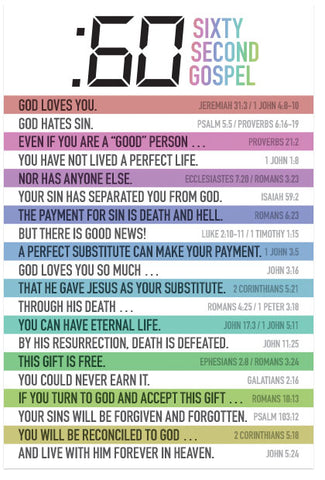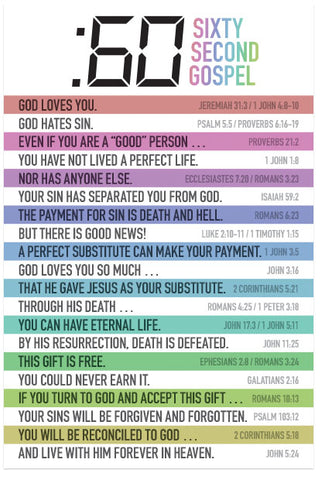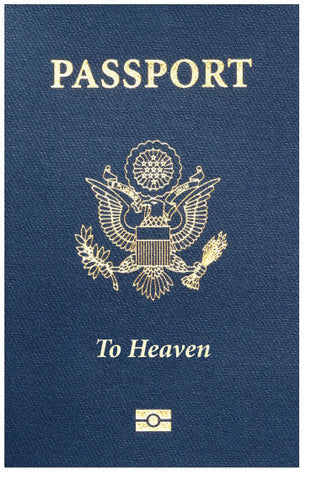Obstacles To Revival
Special-Order Folded Tract
 NOTE: This item is custom-printed to order (click for more details).
NOTE: This item is custom-printed to order (click for more details).
This tract is from our print-on-demand library, and is not kept in stock. Select the options below, and we will custom-print a batch just for you. Because this item is custom-printed, you can add your custom imprint to the back page at no extra cost.
- Estimated shipping date: Thursday, March 26 (Click for more details)
- SKU:
- Discounts: Discount coupons do not apply to this item
- Format: Folded Tract
- Size: 3.5 inches x 5.5 inches
- Pages: 8
- Imprinting: Available with 5 lines of custom text
- Version: KJV
- Returns: Because this item is custom-printed to order, it cannot be returned.
Show all item details
The full text of this tract is shown below in the KJV version. (Do you want to print this tract in a different version than the one listed? Contact us and let us know what you're looking for—we may be able to create the alternate version for you at no charge.)
Obstacles to Revival
There is only one obstacle that can block up the channel and choke God’s power, and that is sin. It alone can hinder the work of the Spirit and prevent a revival. “If I regard iniquity in my heart,” declared David, “the Lord will not hear me” (Psalm 66:18). And in Isaiah 59:1,2, we have these significant words: “Behold, the Lord’s hand is not shortened, that it cannot save; neither His ear heavy, that it cannot hear: but your iniquities have separated between you and your God, and your sins have hid His face from you, that He will not hear.” Sin, then, is the great barrier, and it must be put away. Nor is there any alternative. There can be no compromise. God will not work as long as there is iniquity covered up.
In Hosea 10:12 we read, “Sow to yourselves in righteousness, reap in mercy; break up your fallow ground: for it is time to seek the Lord, till He come and rain righteousness upon you.” And in 2 Chronicles 7:14, blessing is promised, based, however, upon unalterable conditions: “If My people, which are called by My Name,” declares the Lord, “shall humble themselves, and pray, and seek My face, and turn from their wicked ways; then will I hear from heaven, and will forgive their sin, and will heal their land.” Hence, nothing short of a broken heart over sin, full confession and restitution, will satisfy God. Sin must be utterly forsaken.
Sorrow for the consequences and pun-ishment of sin is not sufficient, but sorrow for sin itself as committed against God. Hell is full of remorse, but only for the punishment incurred. There is no real contrition. The rich man uttered not a word of sorrow for his sin against God (Luke 16:24). David, though guilty of both murder and adultery, saw his sin as against God alone (Psalm 51:4). Mere remorse is not true godly sorrow unto repentance. Judas, though filled with remorse, never repented.
Now God alone is able to bestow a contrite and broken heart, a sorrow that will result in the confession and forsaking of sin. And nothing short of that will suffice. “The sacrifices of God are a broken spirit: a broken and a contrite heart, O God, Thou wilt not despise” (Psalm 51:17). “He that covereth his sins shall not prosper: but whoso confesseth and forsaketh them shall have mercy” (Proverbs 28:13). “Only acknowledge thine iniquity, that thou hast transgressed against the Lord thy God” (Jeremiah 3:13).
There are three kinds of confession
that must be considered:
1. Private Confession. Where sin has been committed against God alone, it need be confessed to none but God (1 John 1:9; Psalm 32:5).
2. Personal Confession. Where the sin has been committed against another, it must be confessed not only to God but also to the one who has been wronged. Nor will there be any peace until the confession has been made and forgiveness sought (Matthew 5:23,24).
3. Public Confession. Where the sin has been committed openly, the confession must be as public as the transgression.
As long as iniquity among the people of God is covered over and unconfessed, just so long will the Spirit of God be unable to bring about a revival. Men must get right with each other in order to be right with God.
It is a common experience for groups of people to gather together for nights of prayer for a revival and yet never have their prayers answered. What is the trouble? Let the Word of God answer. “Your iniquities have separated between you and your God, and your sins have hid His face from you, that He will not hear.” Hence, let us uncover our sin first of all; let us make straight the crooked ways, let us gather out the stones, and then we may ask in faith and expectancy for showers of blessing.
Now let us take our sins one by one and deal with each transgression separately. And let us ask ourselves the following questions. It may be we are guilty and God will speak to us.
•Have we forgiven everyone? Is there any malice, spite, hatred or enmity in our hearts? Do we cherish grudges; and have we refused to be reconciled?
•Do we get angry? Are there any uprisings within? Is it true that we still lose our temper? Does wrath hold us at times in its grip?
•Is there any feeling of jealousy? When another is preferred before us, does it make us envious and uncomfortable? Do we get jealous of those who can pray, speak and do things better than we can?
•Do we get impatient and irritated? Do little things vex and annoy? Or are we sweet, calm and unruffled under all circumstances?
•Are we offended easily? When people fail to notice us and pass by without speaking, does it hurt? If others are made much of and we are neglected, how do we feel about it?
•Is there any pride in our hearts? Are we puffed up? Do we think a great deal of our own position and attainments?
•Have we been dishonest? Is our business open and above reproach? Do we give a yard for a yard and a pound for a pound?
•Have we been gossiping about people? Do we slander the character of others? Are we talebearers and busybodies?
•Do we criticize unlovingly, harshly, severely? Are we always finding fault and looking for the flaws in others?
•Do we rob God? Have we stolen time that belongs to Him? Has our money been withheld?
•Are we worldly? Do we pursue the pleasures, glitter, pomp, and show of this life?
•Have we stolen? Do we take little things that do not belong to us?
•Do we harbor a spirit of bitterness towards others? Is there hatred in our hearts?
•Are our lives filled with lightness and frivolity? Is our conduct unseemly? Would the world by our actions consider us on its side?
•Have we wronged anyone and failed to make restitution? Or, has the spirit of Zacchaeus possessed us? Have we restored the many little things that God has shown us?
•Are we worried or anxious? Do we fail to trust God for our temporal and spiritual needs? Are we continually crossing bridges before we come to them?
•Are we guilty of lustful thoughts? Do we allow our minds to harbor an impure and unholy imagination?
•Are we true in our statements, or do we exaggerate and thus convey false impressions? Have we lied?
•Are we guilty of the sin of unbelief? ln spite of all He has done for us, do we still refuse to believe the promises of His Word?
•Have we committed the sin of prayerlessness? Are we intercessors? Do we pray? How much time are we spending on our knees? Have we crowded prayer out of our lives?
•Are we neglecting God’s Word? How many chapters do we read each day? Are we Bible students? Do we draw our source of supply from the Scriptures?
•Have we failed to confess Christ openly? Are we ashamed of Jesus? Do we keep our mouths closed when we are surrounded by worldly people? Are we witnessing daily?
•Are we burdened for the salvation of souls? Have we a love for the lost? Is there any compassion in our hearts for those who are perishing?
These are the things, both negative and positive, that prevent the work of God in the midst of His people. Let us be honest and call them by their right name. “Sin” is the word that God uses. The sooner we admit that we have sinned and are ready to confess and forsake it, the sooner may we expect God to hear us and work in mighty power. Why deceive ourselves? We cannot deceive God. Then let us remove the obstacle, the hindering thing, before we take another step. “If we would judge ourselves, we should not be judged”
(1 Corinthians 11:31). “Judgment must begin at the house of God” (1 Peter 4:17).
Oh then, let us plead first of all the prayer of David when he cried, “Search me, O God … and see if there be any wicked way in me” (Psalm 139:23,24). And no sooner will the obstacle of sin be taken out of the way than God will come in mighty reviving power.—O.J.S.















